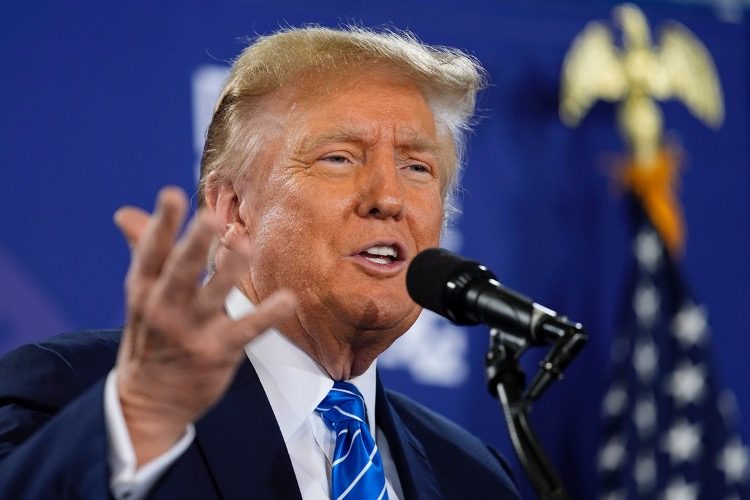
The adage coined by former U.S. House Speaker Tip O’Neill that “all politics is local” may be giving way to a new paradigm — one that can be seen clearly in Donald Trump’s dominance in the Republican primary race.
American politics has traditionally been driven by local issues, concerns, and personalities. Congress, while dealing with federal legislation that affects the entire country, has always been an arena in which various local interests clamor for attention (and money — hence the constant passage of pork-barrel spending for local projects).
And even presidents, who are elected in what is considered a “national election,” have long had to play the delicate game of maintaining coalitions of diverse local and regional interests.
In the 1960 election, John F. Kennedy won in part because he gained the favor of Chicago Mayor Richard M. Daley, the powerful head of the city’s political machine. Daley’s machine was known for its ability to deliver votes, and he controlled a large and loyal Democratic base. By securing the support of Daley and the Democratic Party in Illinois, JFK had a better chance of winning the state’s electoral votes.
Moreover, Daley, as the mayor of Chicago, was influential within the Democratic Party, and his support was instrumental in securing the delegates needed to get Kennedy the nomination at the 1960 Democratic National Convention in Los Angeles.
But Trump’s virtual steamroll through the GOP primary has shown that his brand of national politics, MAGA, is strong enough to overcome the local political machines that once played such a crucial role in presidential races. He handily defeated the power brokers in the first two states of the primary cycle: Iowa and New Hampshire.
In Iowa, the popular Republican governor, Kim Reynolds, endorsed Florida Governor Ron DeSantis, who also had the support of influential activist Bob Vander Plaats and his evangelical machine. In New Hampshire, Governor Chris Sununu put his weight behind former UN Ambassador Nikki Haley. None of this was enough to stop Trump from winning in both contests.
David Kochel, a Republican strategist from Iowa, told Politico, “It turns out that all the money in the world, 99-county tours and endorsements by the biggest political leader in the state and the biggest evangelical leader in the state was not enough to beat Donald Trump. Cable news and all the progressive and conservative media ecosystems tend to treat this all as a big national storyline. And then people follow it that way.”
The outlet further observed:
The old way of campaigning in New Hampshire — campaigns reaching out to potential voters at house parties and hoping they, in turn, tell others — is on life support. Campaigns did far less voter contact this time around: Only 23 percent of probable Republican primary voters interviewed in the closing days of the campaign by a Monmouth University-Washington Post poll said they’d been personally contacted by someone encouraging them to support one of the candidates. That was down sharply from the same poll in February 2016, in which 49 percent of Republican primary voters said they’d been personally contacted.
Absent a friendly door knock from a familiar face, or any face at all, voters have been left with whatever beams into their living rooms or flashes across their devices on any given night: An ad from a super PAC featuring Trump, talking heads chattering about Trump, Trump himself in a courtroom.
More than ever before, the goings-on in Washington, D.C., are driving the narrative in races big and small — federal, state, and local — throughout the country. Candidates running for county commission or school board can no longer get away with merely talking about potholes and school budgets — voters demand to know their positions on abortion, immigration, race relations, and a host of other national issues.
Given this new landscape, political analysts are asking themselves if this is a good thing or a bad thing.
One disadvantage is that, in such a climate, legitimate local issues can get neglected. This is especially the case when so much of modern mass media is nationalized and centralized, with news stations that care little for local issues that aren’t lucrative to talk about to a national audience.
This can also lead to unscrupulous politicians firing up their base with their stances on national issues only to take actions on local issues that will be harmful to the community.
On the other hand, the more national nature of modern politics reduces the dominance of local political machines and the corruption that often comes with them. It also forces local politicians to disclose their views on major issues, thus allowing voters to see whether these individuals are patriots or not — whereas previously, the lack of discussion about national issues in local races made it possible for closet liberals to get elected in otherwise conservative areas and then use their elected positions to discreetly promote Marxism.
Ultimately, what we’re seeing is a political realignment, the creation of a new conservative movement in which adherence to a specific ideology and policy platform transcends state boundaries.




